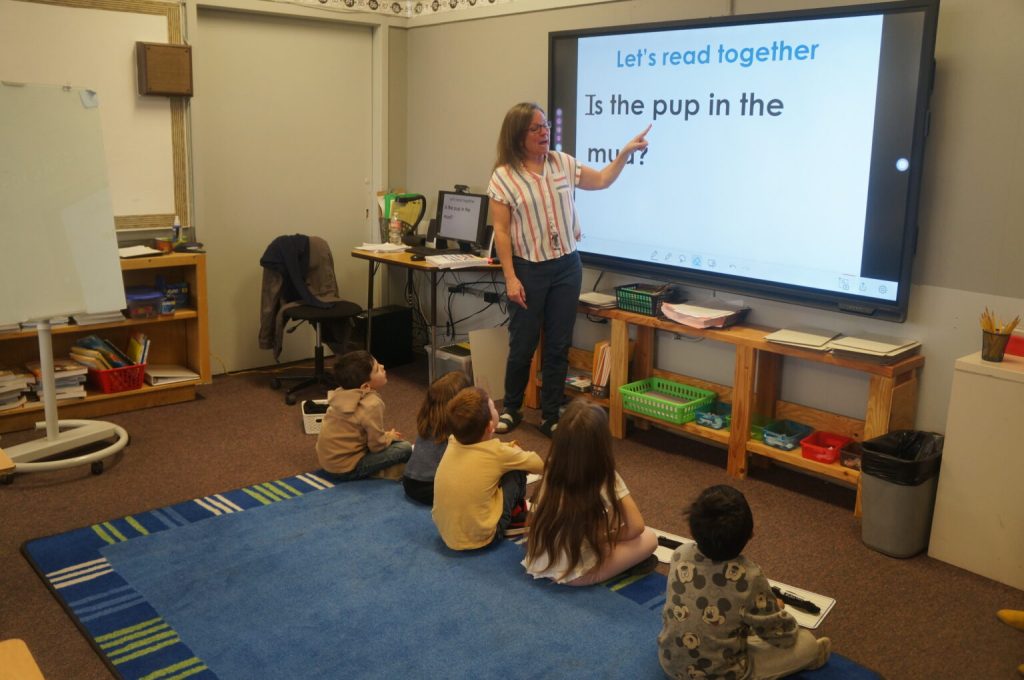Bills to help Oregon schools fund years of summer learning await governor’s signature
Published 6:19 am Friday, April 18, 2025

- Students are taught how to sound out letters during a phonics lesson at Ferguson Elementary School in Klamath Falls on April 7, 2023. (Alex Baumhardt/Oregon Capital Chronicle)
Oregon schools will soon have something they’ve never had before: more than a year to plan for summer school with the promise of consistent funding from the state Legislature. But it comes with one condition: The money should be spent on programs that get students reading and writing at grade level.
On Thursday the Senate passed two bills nearly unanimously — House Bill 5047, which appropriates $35 million for summer learning grants for 2025, $35 million for 2026, and $12 million for June of 2027 — and House Bill 2007, establishing which programs qualify for the summer grants. Both bills passed the Oregon House unanimously on April 9 and now await Gov. Tina Kotek’s signature.
Kotek indicated at a news conference Tuesday she would sign the bills and said the unanimous votes to pass both in the House earlier in the month were highlights of the session for her so far.
“I’m very appreciative of legislative leaders for showing their commitment to that issue. I think it’s really important for our students to have access to summer learning programs,” she said.
The $35 million available to schools this summer is welcome, but untimely, for many school administrators. Most smaller school districts are wrapping up planning for summer programs by April, and most larger districts start planning as early as October. Last year, schools didn’t learn until March whether they’d receive a portion of $30 million in summer grants. For some, the money came too late to expand their offerings.
But knowing schools have the money next year, and in years ahead, is a game changer, bill advocates said. House Bill 5047 also makes clear that the funding is intended to be ongoing at $70 million per biennium, from a fund housed in the Treasury rather than from the state’s general fund, to help support three months of summer learning programs every year in perpetuity.
“We’re thrilled the days of last minute investment and planning for summer learning are finally over,” said Anna Higgins, policy director for the education nonprofit Foundations for a Better Oregon.
House Bill 2007 underwent a number of amendments over the last few months after school leaders and education advocacy groups expressed concern that granting money only for literacy-specific, at-school programs was too narrow.
It’s since been expanded, to allow schools to fund summer programs that aid in credit recovery, use “evidence-based” curriculum to teach language arts as well as math and science, and to allow schools to partner with community-based organizations and colleges to offer programs. It was also changed to make room for summer literacy programs that include “enrichment activities” outside of the classroom, as long as they improve student academic outcomes.
The Oregon Department of Education, which will distribute the grants, is required to prioritize schools with the lowest rates of reading proficiency when awarding funds. In the future, the bill allows the agency to recommend other academic areas to target supper learning grants as needed.
School administrators and education groups, such as Foundations for a Better Oregon, who advocated in public hearings that the bill be expanded to include more community organizations, activities, and academic focus areas, said they were pleased with the amended bill.
“While there’s more work to do to eliminate barriers and actually incentivize school-community partnerships, which are critical to reaching academic goals for historically underserved students, this bill marks an important milestone for expanding access to out-of-school learning for Oregon’s kids,” Higgins said.
For the last few years, school administrators have asked the Legislature repeatedly to dedicate funding for summer school, and to do so with consistency so they can plan ahead. Instead, the Legislature has repeatedly punted the decision to the end of sessions, leaving schools with notice that they can apply for some additional state funding weeks before programs are due to begin.
In the aftermath of COVID and school closures, the need for summer learning programs to help students catch up gained urgency in the Legislature. Former Sens. Peter Courtney and Michael Dembrow, Democrats from Salem and Portland, respectively, even proposed investing in robust summer learning programs could be a runway for eventually introducing year-round school.
In 2021, schools received more than $200 million, and in 2022 they were allocated $150 million. But in 2023, the Legislature did not send schools any additional summer school money, and instead hoped they would spend the last of their federal COVID-relief dollars. Schools cut programs and some nonprofits stopped offering summer programs altogether.







